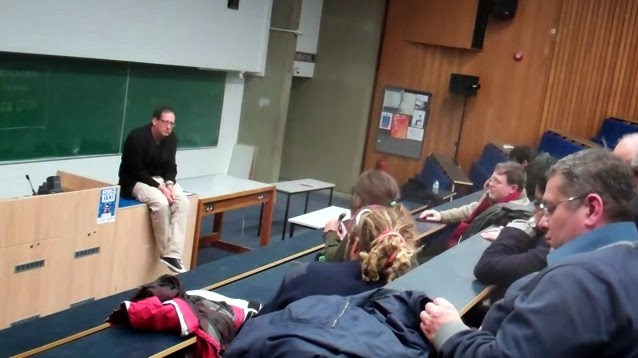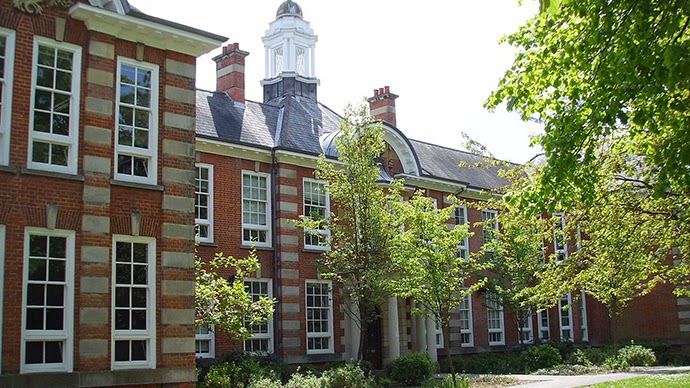The Zionist Lobby is a Threat to Freedom of Speech
Remember all the hypocritical cant about freedom of speech in the wake of the murder of journalists at Charlie Hebdo? About how terrorism would not be allowed to silence the power of the pen? Forget it. Under the guise of ‘anti-terrorism’ the Zionist lobby is up to its old tricks, with support from the Communities Secretary, Eric Pickles.
 |
| Eric Pickles – Tory Minister who has added his (considerable) weight to the campaign to ban the Conference |
A group of academics, primarily based at Southampton University, have organised a Conference “International Law and the State of Israel: Legitimacy, Responsibility and Exceptionalism,” scheduled for 17-19 April. You might wonder what could be more innocuous but of course international law isn’t something that Israel is particularly keen on.
expressing “principled and full support for the University of
Southampton’s commitment to freedom of speech and scholarly debate.”
The University of Southampton has come under intense pressure in respect of the conference. The conference will “engage controversial questions concerning the
manner of Israel’s foundation and its nature, including ongoing forced
displacements of Palestinians and associated injustices,” the organizers
wrote in a statement to The Electronic Intifada.
 |
| Olive grove that the settlers love to burn |
The organizers are University of Southampton law professor Oren
Ben-Dor; George Bisharat, professor at the University of California
Hastings College of Law; Juman Asmail, a law graduate from Southampton
and Southampton engineering professor Suleiman Sharkh.
The conference “will examine how international law could be deployed,
expanded, even re-imagined, in order to achieve regional peace and
reconciliation based on justice,” the organizers add.
The provisional program
includes presentations from a range of well-known academics and experts
including University of California at Los Angeles historian Gabi
Piterberg; Nur Musalha, a historian who has written extensively about
Zionist plans to expel Palestinians; University of Exeter historian Ilan Pappe and Princeton University emeritus professor and former UN Special Rapporteur Richard Falk, among others.
Smear campaign
Pro-Israel media and lobby groups have been mounting an ever more
shrill campaign using Islamophobic themes and casting aspersions of
anti-Semitism to smear organizers and speakers.
Some have called for the conference to be banned outright, while
others are urging the university to require pro-Israel speakers, on the
grounds that the conference is “one sided.”
This is an interesting ground of objection. Presumably conferences on the Holocaust or Apartheid in South Africa should have defenders of the Holocaust and Apartheid given equal weight!
The Jerusalem Post reports
that late last year, “leaders of the Jewish community, including
representatives of the Jewish Leadership Council, Board of Deputies and
the Union of Jewish
Students” sent a letter to the university to cancel
the conference.’
The Post says it has “exclusively” seen “extracts” of the letter.
A Southampton spokesperson emailed The Electronic Intifada that the
university “received a number of representations concerning this
conference, both those expressing concerns and those in support,” but
would not provide details of the organizations that had approached it.
The Electronic Intifada has filed a Freedom of Information request
with the university in an effort to bring more light on the Israel
lobby’s campaign against academic freedom.
Zionist Federation petition
The UK’s Zionist Federation launched a petition calling on the university to ban the conference, a demand to which several members of parliament have added their voices.
The mass circulation tabloid The Daily Express published an op-ed
associating the conference with support for the notorious Islamic State
militant “Jihadi John” and demanding that the government cut funding to
Southampton.
The Jewish Chronicle trumpeted
criticism by a former Conservative government minister and quoted
Southampton mathematics professor Tim Sluckin claiming that the purpose
of the conference is to “delegitimize Israel.”
Sluckin, who is also secretary of the Southampton Hebrew
Congregation, said the conference “makes me feel uncomfortable as a
Jew.”
Government collusion
Perhaps the most worrying aspect for supporters of free speech is the
apparent collusion of UK government officials in the attempt to smear
and suppress the conference.
Last week, Conservative cabinet minister Eric Pickles warned the
University of Southampton against “allowing a one-sided diatribe.” According to Jewish News,
this made Pickles, who is Secretary of State for Communities and Local
Government, “the most senior politician yet to intervene” over the
conference.
Last December, Pickles’ department issued a report promising
“government action on addressing anti-Semitism.” But as The Electronic
Intifada reported,
the government document “conflates anti-Semitism with criticism of the
State of Israel” and misrepresents the Palestinian call for the academic
boycott of Israeli institutions.
Pickles has consistently conflated “anti-Semitism” with solidarity for Palestinians. He has for instance condemned
the London Borough of Tower Hamlets for “flying a Palestinian flag.”
London municipalities have a long tradition of international solidarity,
especially during the struggle against apartheid in South Africa.
The Jerusalem Post also revealed
that in February, UK ambassador to Israel Matthew Gould met with UK
university heads to discuss the limits of “freedom of speech” relating
to Israel.
According to the Post, the University of Southampton’s refusal to cave in over the conference was a topic of discussion in the meeting.
Ben White writes for Middle East Monitor
that the university’s “stubborn commitment to freedom of speech has
clearly angered Britain’s Israel lobby, but the bigger question here is
why a UK ambassador was involved in the first place.”
The UK Foreign Office confirmed to White that the meeting had taken
place but as White notes, the government spokesperson “did not elaborate
on whether lobbying British universities” on behalf of Israel “was part
of the ambassador’s remit.”
“Legal obligations”
The organizers have rejected accusations that the conference is “one sided.”
“Diligent efforts, including face-to-face meetings with leading
intellectuals in Israel, were made to ensure the widest range of
opinions possible,” the organizers wrote in their statement.
“Those who chose to abstain, however, cannot derail the legitimate,
if challenging, academic discussion the conference will inspire.”
The organizers also say that are “deeply grateful for the University
of Southampton’s commitment to freedom of speech and expression, which
should set an example for universities worldwide.”
But the university has been more circumspect. Its spokesperson
assured The Electronic Intifada that it “is legally obliged under the
Education (No. 2) Act 1986, to ensure that freedom of speech within the
law is secured for members, students and employees of the university, as
well as for visiting speakers.”
“We must ensure that academic staff have the freedom within the law
to question and test received wisdom, and to put forward new ideas and
controversial or unpopular opinions.”
University appeasing critics?
But in what looks like an attempt to appease critics, the
spokesperson adds that “For the avoidance of doubt, the University of
Southampton is not expressing an opinion or taking any particular
standpoint in relation to the conference, ‘International Law and the
State of Israel,’ but is fulfilling its legal obligations.”
Universities often endorse conferences and take strong stances in
favor of various kinds of research on human rights, economic, medical or
environmental issues.
For instance, University of Southampton Vice-Chancellor Don Nutbeam enthuses about a new research collaboration between his institution and the insurance company Lloyds Register.
But Southampton’s statement about the Israel conference follows an
emerging pattern among universities that have come under attack for
research or advocacy in relation to Palestinian rights: administrators
assert their minimum obligations on free speech grounds while distancing
themselves from the content, as if believing that Israel should be held
accountable under international law were something odious and
offensive.
Pressure is being exerted on the University of Southampton to cancel or ‘reconstruct’ a conference
on Israel and international law scheduled for 17-19 April. Groups such
as the Board of Deputies of British Jews and UK Zionist Federation have
urged the university to cancel the event, and there has also been an
intervention from Communities minister and Conservative MP Eric Pickles.
To add your name to the below statement please email [email protected]
The statement and signatory list will appear here (and will be updated with names accordingly):
Statement in support of the University of Southampton
We, the undersigned academics, express principled and full support for the University of Southampton’s commitment to freedom of speech and scholarly debate.
We commend the University of Southampton administration, including Vice-Chancellor Don Nutbeam, for its resolute defence of academic freedom.
It is standing principle and recognised practice that academic
conference organisers have the right to choose those speakers and topics
they feel would best address the purposes of the conference, without
these being dictated to them by outside parties.To the best of our
knowledge, the conference invitations in this case are based on
qualification to speak on the topic rather than on political positions
held.
We affirm, as academics from various disciplines and institutions of
higher education, that the themes of the conference, such as the
relationship of international law to the historic and ongoing political
violence in Palestine/Israel, and critical reflections on nationality
and self-determination, are entirely legitimate subjects for debate and
inquiry.
We are very concerned that partisan attempts are being made to silence
dissenting analyses of the topic in question. For external pressure and
interference, especially from political lobby groups and a government
minister, to censor lawful academic discussion would set a worrying
precedent.
We trust that the programme of ‘International Law
and the State of Israel: Legitimacy, Responsibility and Exceptionalism’
will go ahead as planned, to the credit of the University of Southampton and all those involved.


